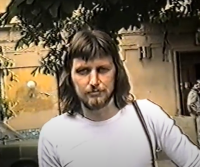Physical pressure was manageable in the interrogation, but when they touched my family, it was bad.

Stáhnout obrázek
Karel Mrázek was born on 26 August 1957 in Chomutov. He lived through the August 1968 occupation in his hometown, where he and other friends wrote anti-occupation slogans on passing cars. After graduating from a vocational school, he joined VTŽ in Chomutov as a mechanic of measuring and control technology. As a young man, he was very interested in music, thanks to which he met Miroslav Skalický, among others, and subsequently other important people from the underground. In 1976 he joined the military service in Prague, where he had the opportunity to meet other representatives of the underground and this time also of the dissent. After the end of the war, he returned to Chomutov and began to participate fully in the underground life and events in Nová Viska near Chomutov - a community of like-minded people was formed in the local homestead. In addition to this, he was also actively photographing, among other things, anti-regime events and various underground meetings. He then distributed the images among the underground and also among dissidents. He was behind the first issues of Vokno magazine, for which he created the iconic front page. Over time, he contributed to Nos and Ekologický bulletin. He experienced regular interrogations and detentions for 48 hours. In 1986, he officially signed Charter 77. In the late 1980s, he regularly participated in anti-regime demonstrations and actions, and was also involved in their preparation. He himself organised demonstrations in his native Chomutov. After 1989, he became mayor of Chomutov and defended his post in the next elections. At the time of filming (2024) he lived in Chomutov.
